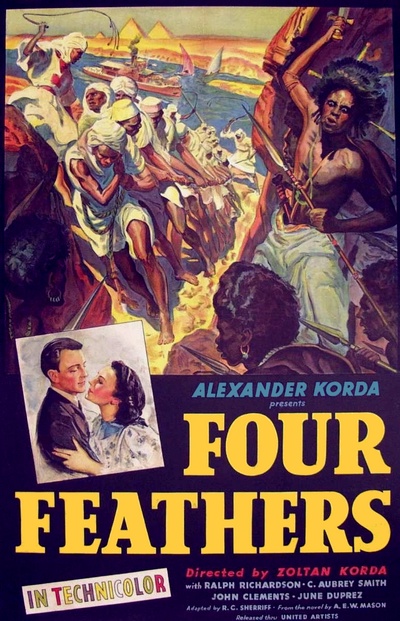
The Four Feathers (1939) "The army is soft, now. In my day it was different: men were men, and war was war . . ." During a British imperialist war in Egypt, a sensitive young man from a military family, Harry Faversham, resigns his commission before his regiment is dispatched to active duty. His apparent contempt for the war and the army so scandalizes his friends and family that four of them present him each a single white feather, the symbol of a coward. Shamed into realizing that guilty fear has made him shun his duty, he resolves to perform some act of bravery to erase the stain of coward from his name--or die trying. This fantastically thrilling little gem from British filmmakers takes a fascinating look at true courage as it traces the adventures of this military outcast who disguises himself as a native and goes behind enemy lines to save those he loves without their support or even their knowledge, facing hellish African heat and thirst, frightening battles in which both sides are trying to kill him, and even torture. The cinematography, for its time, is breath-taking, and the performances--especially John Clements as the hero and Ralph Richardson as his tragic best friend--are superb. A special treat in this film is C. Aubrey Smith, a very good character actor who played many "old soldiers" in his time; this role is one of his most delightful, as a retired general who retells his favorite battle stories at every single dinner.

How Green Was My Valley (1941) "There is no fence nor hedge around time that is gone. You can go back and have what you like of it, if you can remember." Set in a rural mining community in Wales about the turn of the century, this film takes a peak at the negative effects massive industrialization had on homes, on families, and on individuals. It's told from the perspective of a little boy growing up in the mining town where his father and brothers all work, and shows through his eyes the life-changing experiences that are part of living in a family and in a community: celebrations, marriages, illness, trouble at school, labor strikes, unrequited love, birth and death. Although the story and milieu are very different from legendary director John Ford's Old West repertoire, if any of his films is really and truly a work of art, this is it.

Friendly Persuasion (1956) "A man's life ain't worth a hill of bean's except he lives up to his own conscience." This film is a good one for a quiet Sunday afternoon. Gary Cooper plays a home-lovin' Quaker farmer, with the sweet-faced Dorothy McGuire playing his wife (and local woman "preacher" for their Quaker community). They're "plain folks," and most of the movie is taken up by fun little family anecdotes including horse-racing rivalry between neighbors, a vicious goose, young love, and controversy over bringing music into the Quaker household. The climax is provided when the Civil War suddenly interrupts their otherwise-peaceful home and family life. There's a couple interesting themes that run through this: how, for example, in marriage, both spouses may have to compromise a little to make their marriage work. The main theme, however, is a profound one about violence and whether the Quakers are obeying their conscience or shirking their duty by refusing to fight in the War.
His Girl Friday (1940) "You've got an old fashioned idea divorce is something that lasts forever, 'til death do us part.' Why divorce doesn't mean anything nowadays, Hildy, just a few words mumbled over you by a judge." Fast-paced and hilarious, this is a crazy comedy--with some dark, rough edges--set in the wild world of journalism in the 1930's. Originally a stage play called "The Front Page," it tells of a newspaper editor and his ex-wife, who used to be his best reporter and who is currently scheduled to marry a nice, honest small-town insurance salesman. The editor (Cary Grant), who frankly is just something of a heel, makes a last attempt to get his wife (Rosalind Russell) back by convincing her to cover one final story for the paper, about an insane man condemned for murder and a corrupt governor. The dialogue is brilliant, rapid-fire style, and Russell and Grant can snap it back and forth at each other as if they had been doing it for years. Incidentally, this was also the very first film in which characters spoke at the same time, even talking over each other (before, one person at a time would say their lines). It's also a glimpse at the mentality of the era in the casual, even flippant attitude towards marriage and divorce. (Reminds me of a certain GKC quote: "Frivolous marriage leads to frivolous divorce.")
Thanks for the film reviews. :-) The movies sound interesting, especially the last one. (Plus, always have to like a film review which includes a GKC quote! lol)
ReplyDeleteBTW, you need to keep on writing more posts. I read through all of the posts on your blog a few days ago, and you are a very good writer!
"Four Feathers" and "Friendly Persuasion," yes! Great movies!
ReplyDeleteWow, thanks so much, Mike! :) I really appreciate the encouragement!
ReplyDeleteEmily, I'm so glad you agree! I haven't met very many people who've even heard of "The Four Feathers," so it's awesome to know that someone else out there likes it, too! :)
Friendly Persuasion...such a great film! As for the others, I'm going to have to watch them! Oh, how I love old movies. Classic longevity still lives, I see, through those who appreciate its worth!
ReplyDelete